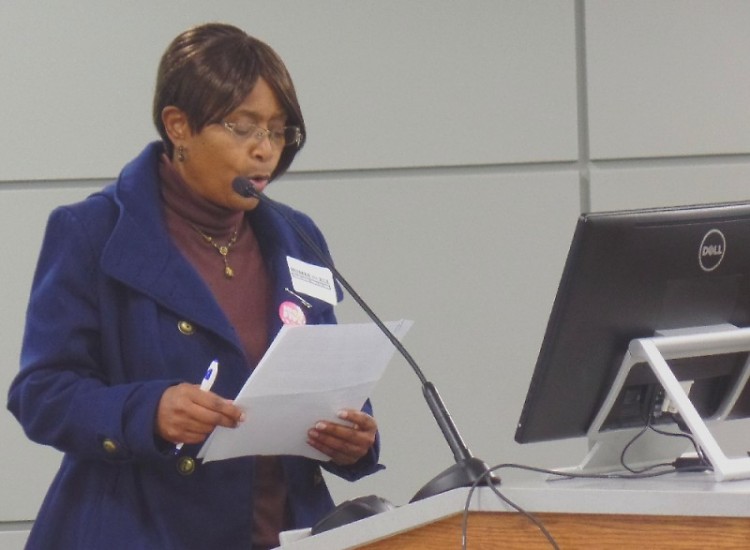In August of 2016, I was inspired by two very different events on the national scene. The first was the candidacy of Bernie Sanders, who encouraged people to get involved in local politics. The second was the horrific police shooting of Philando Castile, followed by a call to action for concerned citizens to demand police reform from their local governing agencies. So it was that after 16 years of living in the city, I decided to attend my first ever Grand Rapids City Commission meeting.
Since then, I’ve been attending Commission meetings fairly regularly. Some are quick; some are boring; some are confusing. Lately they have been more heated as the city’s inequitable outcomes come to light: comments on the lack of affordable housing, low wages, policing and immigrant justice fill the public comment period.
If you decide to attend a City Commission meeting, here are five things I wish someone had explained to me. Knowing these things can help you be less confused and more effective with your time.
- Be prepared. Going into a City Commission meeting without preparation can be confusing.
- Many of the items on the Consent Agenda have already been decided in Committee meetings earlier that day. So the Commission will vote on several sections of the agenda in one vote.
- Before every meeting, the agenda and an agenda packet are available on the City Commission website. (Scroll down past the pictures of the Commissioners.) The agenda packet can be hundreds of pages, but it is organized in order of the agenda items.
- You can use your browser’s Find function - Control F or the Search icon - to search for the documents that explain a particular agenda item. For instance, if you want to know more about an agenda item that mentions development planned on Monroe, search “Monroe” in the agenda packet.
- Speak out. This is the reason many people attend a City Commission meeting, so it helps to know the rules.
- There are up to three public comment periods. At the beginning of the meeting, you can speak to anything on the agenda that will be voted on. If there’s a public hearing on an agenda item, you can speak on that specific item. And at the very end, you can speak about any issue that you think the City Commission should address.
- You will have only three minutes, so write up your statement or make notes for yourself. You are allowed to give the statement or other written materials to the Commission for their review.
- The most effective public comments address one issue, and they either offer an insight or ask for one action that the Commission should perform.
- Consider organizing a group to speak. Recently groups have lined up to speak one-by-one about policing, housing, and immigrant justice issues. The Commissioners are much more likely to respond when several people voice their urgency on a matter.
- Get used to the regulars. You’ll notice that certain citizens speak at every meeting. Watchdog Miller offers criticism of city spending and the bus routes: he also often offers some history of the area. Ruth Hickady and Martha Cooper often speak on how various policies affect low-income families in the city. LaDonna Norman speaks about housing and gentrification. And ever since five boys were stopped at gunpoint by police, Jacquetta Sims speaks about the need for change in police procedure. You can touch base with them before or after the meetings to hear more about their perspective.
- Take notes for Equity PAC or The Rapidian. Equity PAC is a local political action committee, the mission of which is to continually increase the number of equity-minded officials, policies, and practices in West Michigan. Every month the organization issues a report on what area decision-makers are doing regarding key equity issues, so notes regarding these meetings are important. (Contact them here to be involved.) The Rapidian is also always looking for articles about local politics, including opinions by regular citizens.
- Think about your vote. This election season, one seat in each ward (First, Second, and Third) will be contested.
- In the First Ward, Dave Schaffer will be stepping down due to term limits. There will be a primary runoff on August 8 for the seat among Christine Mullan, Catherine Mish, and Kurt Reppart.
- In the Second Ward, incumbent Joe Jones will run against Tami VandenBerg and Mike Farage in the primaries on August 8.
- In the Third Ward, incumbent Senita Lenear will be challenged by Kent Boersema in the November election.
Extra Credit: To understand the inner workings even better, attend the City Committee and other meetings - Community Development, Fiscal, Planning Commission, Committee of the Whole, and more. Some of these occur on the day of the Commission meeting. Many decisions are made during these meetings, and some, like the Planning Commission, the Economic Development Corporation, and the Housing Appeals Board, include citizens from various sectors of city life.
The Rapidian, a program of the 501(c)3 nonprofit Community Media Center, relies on the community’s support to help cover the cost of training reporters and publishing content.
We need your help.
If each of our readers and content creators who values this community platform help support its creation and maintenance, The Rapidian can continue to educate and facilitate a conversation around issues for years to come.
Please support The Rapidian and make a contribution today.
